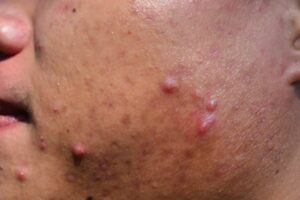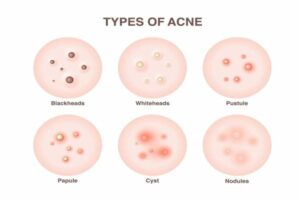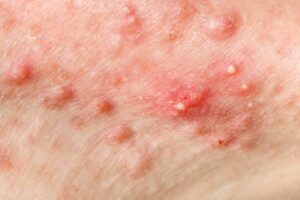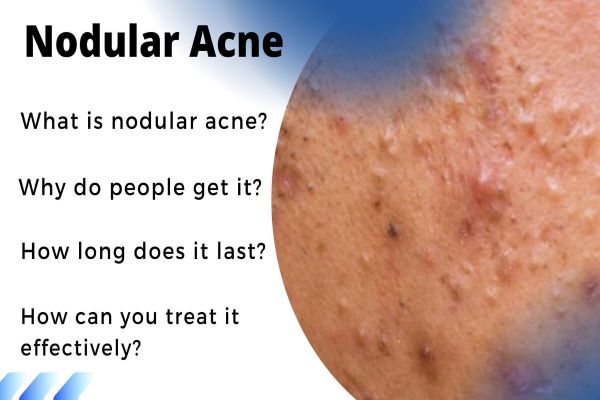Nodular acne is a fad. It’s a severe form of acne, and everyone seems to be talking about it. But what is nodular acne, really? Why do people get it? How long does it last? And most importantly, how can you treat it effectively? We’ll find out the answers!
Worth noting is, it’s recommended to seek the help of a dermatologist in treating nodular acne. If you can’t visit a dermatologist for whatever constrain, don’t leave your acne untreated.
With nodular acne, treatment with over-the-counter products are rarely effective. However, instead of leaving your acne untreated, you can make effort to manage it, and we also discuss various strategies you can adopt in this article.
What is nodular acne
Nodular acne is a form of severe acne that results in large, hard bumps deep under the skin. Nodular acne can be very painful and last for weeks or even months.
If you are suffering from nodular acne, you may be wondering what causes it and how you can get rid of it.
What does nodular acne look like?

Why do you keep getting nodular acne? The causes
Do you find that you keep getting nodular acne, and you often ask why?
There are many possible causes of nodular acne, but one of the most common is hormones.
Hormonal changes during puberty, pregnancy, or menopause can cause an increase in sebum production, which leads to clogged pores and breakouts.
Other potential causes include certain medications, such as corticosteroids or Androgen blockers, as well as stress and diet.
What you can do to manage nodular acne at home.
Home remedies or OTC products are not strong enough to treat nodular acne. However, if you can’t immediately see a dermatologist for whatever reason, you may attempt to manage it using the methods suggested below.
If you are struggling with nodular acne, there are a few things you do at home to manage it;
- First, it is important to cleanse your skin gently with a mild cleanser twice daily.
- Avoid harsh treatments, such as scrubs or astringents, as these can irritate the skin and make nodular acne worse.
- You should also avoid picking or squeezing nodules, as this can lead to infection and scarring.
- If nodular acne is causing pain or discomfort, you can take over-the-counter pain medication, such as ibuprofen, to help ease the pain.
- You may also to try using an over-the-counter topical retinoid or benzoyl peroxide gel.
- If these treatments do not work, you will need to see a dermatologist for prescription medication.
When to see a dermatologist
If your nodular acne does not respond to over-the-counter treatments, you should see a dermatologist.
A dermatologist can prescribe stronger medication, such as oral antibiotics or isotretinoin, to treat nodular acne.
They may also recommend other treatments, such as laser therapy or chemical peels.
If you have nodular acne, it is important to see a dermatologist so that they can assess the severity of your acne and determine the best course of treatment.
Treatments your dermatologist may prescribe.
If over-the-counter treatments are not effective, your dermatologist may prescribe oral antibiotics to help kill the bacteria that is causing nodular acne.
They may also prescribe isotretinoin, which is a powerful medication that is used to treat severe acne.
Isotretinoin can have serious side effects, so it is important to talk to your dermatologist about the risks and benefits of this medication before starting treatment.
Other potential treatments for nodular acne include laser therapy, chemical peels, and light therapy.
These treatments can help to reduce inflammation and diminish the appearance of scars.
Your dermatologist will work with you to determine the best treatment for your individual needs.
How long will it take for nodular acne to go away?
The length of time it takes for nodular acne to go away depends on the severity of the acne and the treatment that is used.
Generally, nodular acne will not go away on its own and will require treatment by a dermatologist.
If you are using prescription medication, it may take several weeks to months to see results. For example, treatment with isotretinoin is typically required for at least 5 months and further courses of treatments may be required.
If you are using over-the-counter treatments, it may take several months to see results.
It is important to be patient and follow the recommendations of your dermatologist in order to see the best results.
The bottom line
Nodular acne is a form of severe acne that can be very painful and last for weeks or even months.
There are many potential causes of nodular acne, such as hormones, certain medications, and diet.
If you are struggling with nodular acne, there are a few things you can do at home to manage it.
However, if over-the-counter treatments are not effective, you should see a dermatologist for prescription medication.
Dermatologists can also prescribe other treatments, such as laser therapy, to help reduce the appearance of scars.
With treatment, nodular acne will eventually go away. However, it is important to be patient and follow the recommendations of your dermatologist in order to see the best results.
However, if over-the-counter treatments are not effective, you should see a dermatologist for prescription medication.
With the right treatment, nodular acne will eventually go away.
Differences between nodular acne and cystic acne

Cystic acne and nodular acne are not the same, though the causes may be similar
While cysts feel soft to touch, nodular acne is hard.
A cystic lesion is filled with pus, whereas nodular acne don’t have pus.
In terms of similarity, both cystic and nodular acne extend deep under the skin, are inflamed and painful to touch.
Over-the-counter treatments are not strong enough to treat cystic acne or nodular acne
Your best bet is to meet your dermatologist for treatment options, as they are the most severe form of acne, and will respond best if treated with prescription strength medication – topical or oral.
Nodulocystic acne

When you have cyst and nodules existing together, it is referred to as nodulocystic acne. Nodulocystic acne is considered to be the most severe form of acne. They will typically need medical attention and are larger than papules and pustules.
Your dermatologist may recommend the following treatments for nodulocystic acne;
- Prescription strength retinoids such as isotretinoin, which is a vitamin A derivative.
- Antibiotic to help destroy acne causing bacteria (e.g. P. acne) that is trapped within your clogged pore.
- Prescription strength salicylic acid to help reduce sebum production and remove dead skin cells clogging your pores.
- Other treatments your dermatologist may consider include laser therapy to help minimize the appearance of scars from nodulocystic acne. Surgical drainage and extraction, chemical peels and blue light therapy are also options your dermatologist may discuss with you.
(As an Amazon Associate I earn from qualifying purchases. Full disclosure…)
Conclusion: The crux of it all
If you end up with nodular acne, it is due to the fact that your acne extends beneath the surface of your skin. At this level, inflammation and infection are taking place from trapped P. acne and dead skin cells. What you see is a large, raised bump that is painful to touch.
Over-the-counter treatments are usually ineffective in treating nodular acne.
However, if you have any constraint that prevents you from seeing a dermatologist for prescription strength medication, there are over-the-counter products you can buy such as Cystic Hormonal and Severe Acne Treatment.
Leaving your acne untreated is the worst decision you can make, as early treatment of nodular acne helps prevent scarring.
After all said and done, see your dermatologist for best treatment option.
If you have had success with treating your a nodular or cystic acne with any over-the-counter product, please let us know what product worked for you in the COMMENT BOX below.
